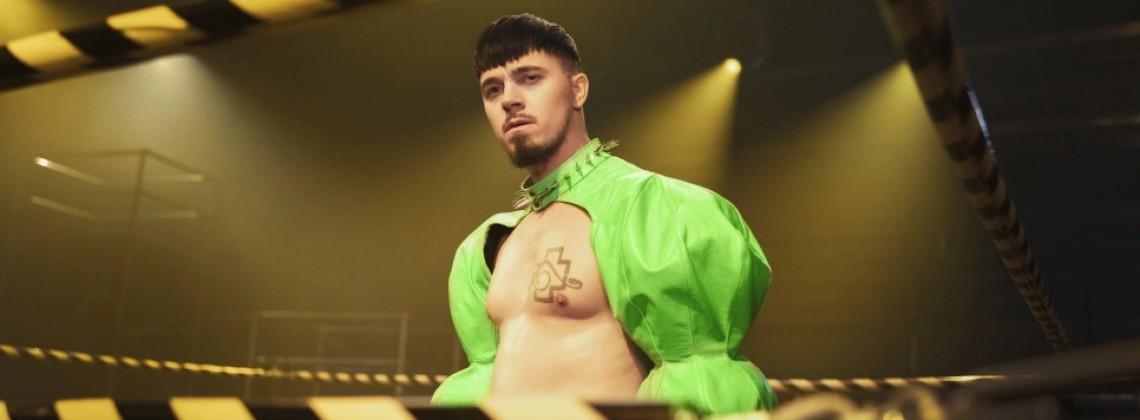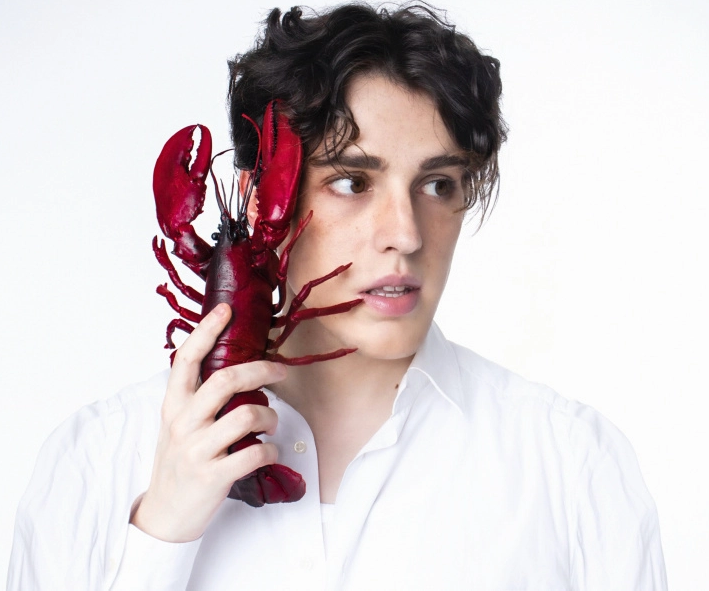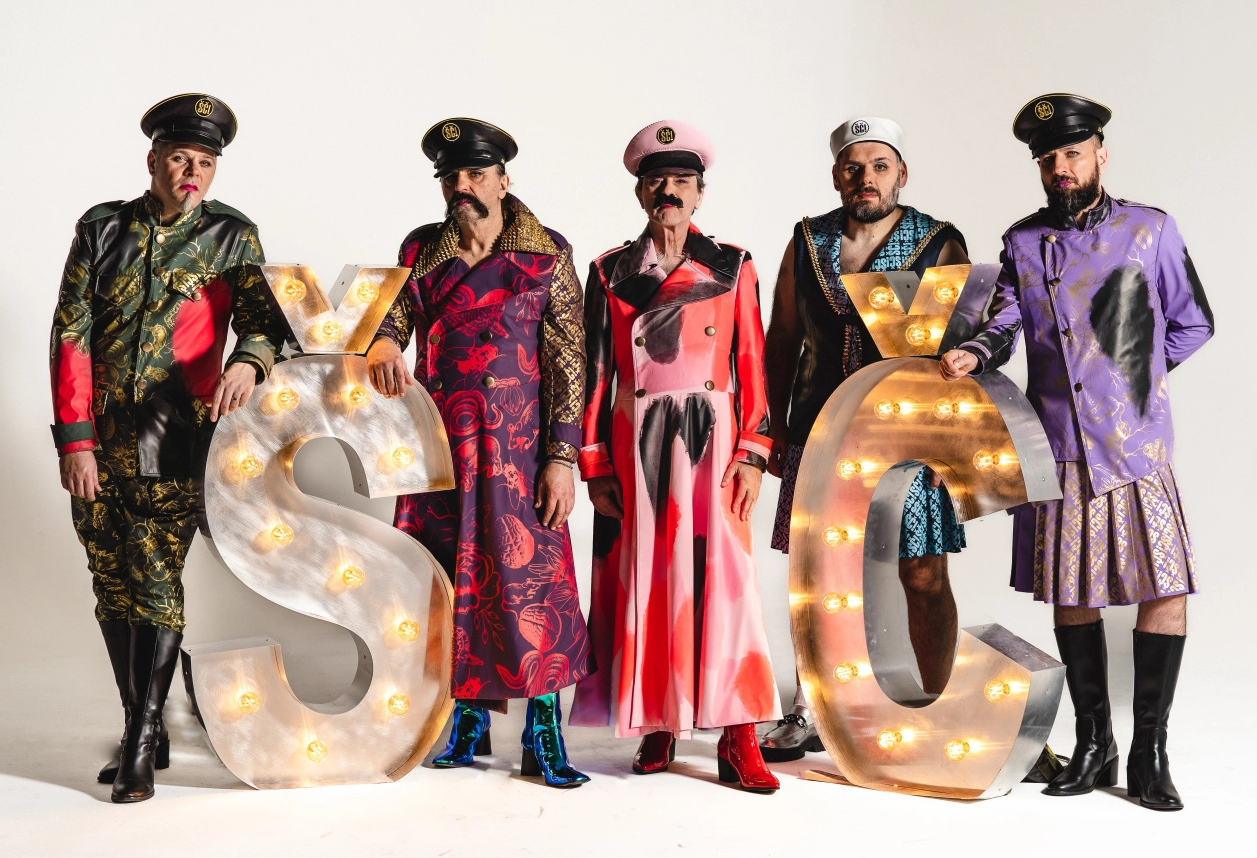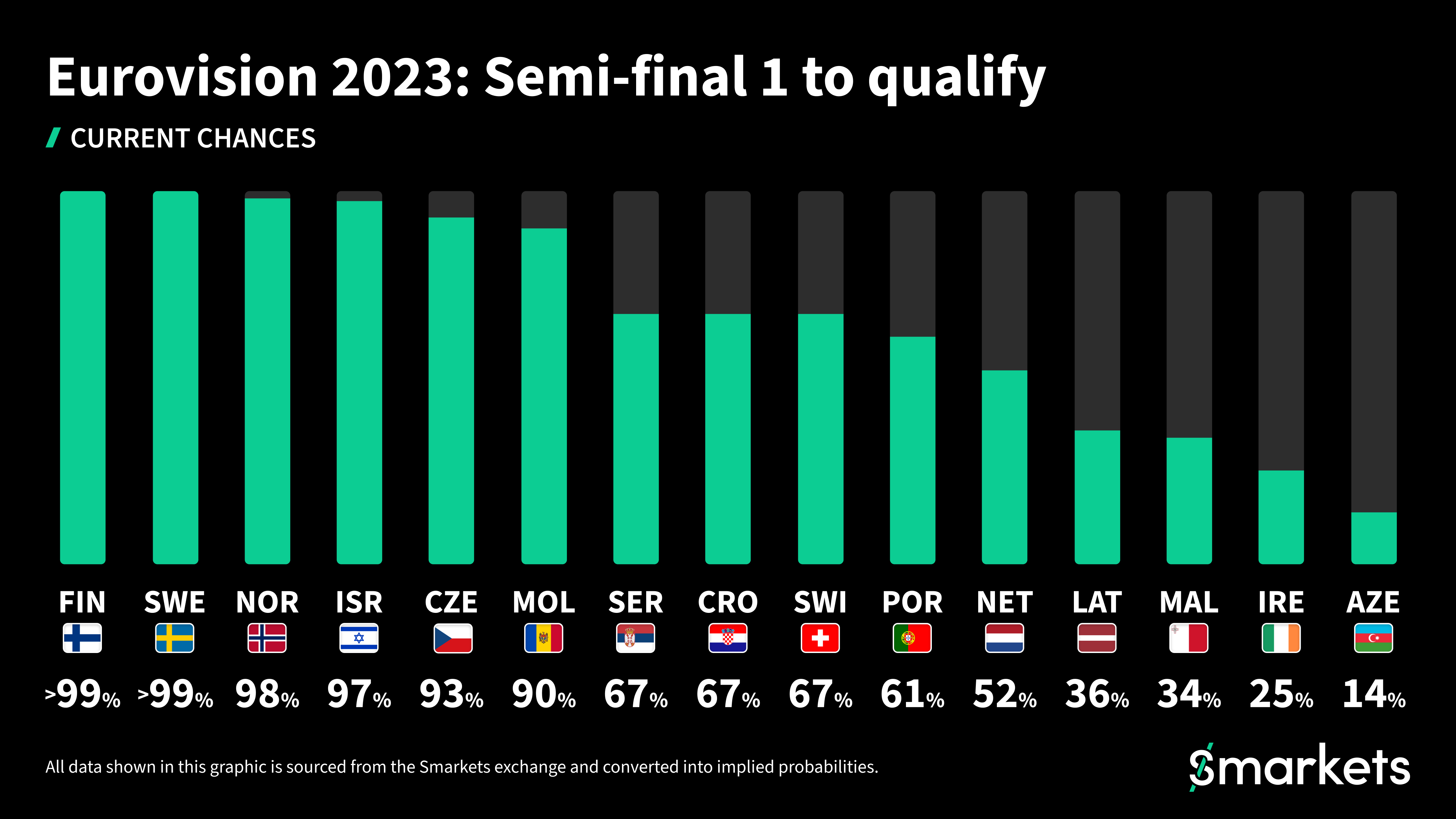
Eurovision 2023: Semi-final 1 betting preview
Patrick Flynn
24 April 2023
Norway
98% chance of qualification
‘Queen of Kings’ is an instantly accessible pop song (undoubtedly ready for a second wave of TikTok virality!) in an environment where many will be hearing the entries for the first time. It’s a clear contender for a top three finish in the semi-final, even from first in the running order. However, I don’t see this entry as a contender for the overall win despite its lofty position (fifth) in the market.
Malta
34% chance of qualification
Poor Malta has been hampered with the so-called ‘death slot’ in the running order. Just two songs in this position have been televote qualifiers out of the last 16 semi-finals, so it’s going to be an uphill battle for The Busker. With that being said, some of the stigma around slot two stems from the fact that songs drawn in second over the years have generally been quite weak, whereas I think this entry is stronger.
Malta isn’t doing very well in Eurovision fan metrics, but this is the type of entry that should go down a bit better with casual viewers. From what I’ve read and experienced myself, the song seems to be received more warmly outside the Eurovision bubble. If it’s performed with an appealing nerdy charm, Malta could well sneak through.
Serbia
67% chance of qualification
Despite the early running order, one should always be wary of underestimating Serbia. Their voting pull means they have never finished lower than 11th in a semi-final in their 13 participations. On all three occasions they failed to qualify, they finished in the highest non-qualifying position.

Luke Black: who will represent Serbia in the 2023 Eurovision Song Contest (photo credit: VASSO VU)
‘Samo mi se spava’ might be a little alienating for some viewers, but it has staging potential, should stand out in the running order and certainly isn’t weak enough to overhaul Serbia’s historic record. The country’s 77% qualification rate feels like a decent estimate of Luke Black’s prospects.
Latvia
36% chance of qualification
It’s a bit of a shame that Sudden Lights are so early in the running order given Latvia’s extremely poor qualification record, one which has seen them make the grand final just twice out of the last 13 attempts. For me, ‘Aijā’ is the strongest Latvian entry since 2016 and a good change of direction. In an evenly split televote/jury semi-final, this would stand a better chance of qualifying, aided by its jury-friendly credentials.
In the last 10 semi-finals, just two of the first five songs have been televote qualifiers on average. Given the entries around them, I suspect that means the grand final will remain elusive for Latvia.
Portugal
61% chance of qualification
Initially 11th in the qualification odds, Mimicat has moved up to 10th after the negative reaction to the Dutch pre-party performances. While Portugal has some friends voting in this semi-final, this feels like one that could go either way.
My main doubts stem from the song’s ‘votability’. I don’t think anyone is going to have a viscerally negative reaction to ‘Ai coração’, but will it be enough people’s favourite?
Ireland
25% chance of qualification
Ireland’s one-in-eight qualification record looks set to extend to one-in-nine. I don’t see this progressing.
Croatia
67% chance of qualification
In my view, Croatia ought to be higher than a 67% qualification chance for a televote-only semi-final. The shock factor of ‘Mama ŠČ!’ and Let 3’s on-stage shenanigans will make it one of the most memorable entries of the night, sticking in viewers’ minds come voting time.
I don’t like using the word novelty as a catch-all term for entries like this as it tends to overlook songs with an actual meaning and purpose behind them (similar to Austria this year and Serbia last year). So for lack of a better term, when I refer to novelty I mean a song with a unique quality whose appeal will be disproportionately geared towards casual viewers and probably wouldn’t be picked up in fan polls.

Croatian entry Let 3 (photo credit: Franko Kelam)
I don’t buy the argument for a second that there is only room for one ‘novelty’ song to do well, or that Let 3 will be overshadowed by other unconventional entries in this semi-final. Both Moldova and Norway made the top four in the semi-final one televote last year, and Ukraine topped it (obviously ‘Stefania’ wasn’t a novelty song, but it had a unique factor which led casual viewers to support it in droves).
In the Eurovision televote, it’s much better to be loved by 10% of viewers and hated by 90% than to be merely tolerated by everyone. As I say every year: televoters can’t vote against a song at Eurovision. This will be many people’s least favourite, but there’s not much those people can do to register their displeasure.
Switzerland
67% chance of qualification
There is a strange dynamic with the Swiss entry that we will undoubtedly come across more often in the new televote-only semi-final era. Here we have a song that could plausibly make the jury’s top ten in the grand final, but jurors may never get the chance to vote for it.
With Croatia and Switzerland both rated a 67% chance of qualifying, this seems like the weaker option. Switzerland doesn’t have many traditional voting allies and ‘Watergun’ isn’t the type of song which usually lights up the televote. Remo Forrer is a good vocalist but I still have some concerns over his stage presence and how he will connect with the camera.
Perhaps some of the Croatia/Switzerland equivalence stems from people subconsciously thinking semi-finals are still 50/50. I ran an experiment on Twitter recently and asked ‘Who will get more televote points: Croatia or Switzerland?’ I thought Croatia would win that poll quite comfortably and they did, with around 80% of the vote. So why are the two rated equally-likely to qualify, next to each other in the running order, in a televote only semi-final?
‘Watergun’ being one of the only ballads in this heat means it should stand out more than it would have in semi-final one last year, for example, but for me this remains a borderline pick.
Israel
97% chance of qualification
Israel is one of the biggest unknowns in this semi-final. At time of writing, there hasn’t been a single live performance of ‘Unicorn’ and Noa Kirel did not appear at any of the pre-parties (including the one in her own country). It’s surprising, as Noa seems like a pretty strong singer from what I’ve seen and, as one of Israel’s biggest popstars, you would think that the Israeli delegation would be keen to promote her as much as possible.
The potential in this song lies mainly in its final 30 seconds and whether the staging team can create a ‘wow’ moment from it (possibly going down the Armenia 2016 route). The Israeli team has shown time and time again their expertise in staging upbeat numbers with slick, dance-driven performances. There’s potential for this to rival Norway for a top three spot.
Moldova
90% chance of qualification
Moldova has become something of a recent televoting powerhouse at Eurovision, with four top five finishes in the semi-final televote in the last five years.
Pasha Parfeni may be able to carve out a niche in this semi-final with his Eastern-European folktronica song with a strong cultural identity, which could see Moldova pick up some big scores from parts of Europe. The Moldovan diaspora in Italy should also see them rewarded by last year’s hosts. ‘Soarele și luna’ is a likely qualifier but I’m not sure I’d go quite as high as 90%.
Sweden
>99% chance of qualification
‘Tattoo’ is a near-certain qualifier and the overall favourite to win the contest right now with a 54% chance. Loreen is the understandable front-runner given everything we know so far, but 54% still feels a little too high for me.
Sweden quite rightfully has a phenomenal record at Eurovision in the last 15 years but their televote underperformance relative to the jury side is a long-standing issue. Their highly polished and technically-strong entries appeal to jurors and industry experts, but televoters generally tend to be much more driven by raw emotion and feeling than technical strength or radio-friendly credentials.
With that said, the pre-parties have highlighted Loreen’s great strength as a performer even without staging, with her and Blanca Paloma being the two standouts of this year’s circuit for me.

Loreen: Sweden's Eurovision 2023 entry who currently tops the outright market (photo credit: Charli Ljung)
If Sweden goes on to win, I think we’ll probably be looking at a 2015-style result with a very strong jury score and around third place in the televote. It’s worth remembering, though, that jury-friendly quality has also improved at Eurovision since Loreen’s first win and we have three songs already in the final: France, Spain and Italy, which should all be faring well on that side of the scoreboard and may eat into Sweden’s potential score.
Concerns remain around the stage show and how it’s going to be adapted from Melodifestivalen. It seems like the staging will still take a while to set up given that Sweden is positioned just after where the breaks usually are in the semi-finals. In all likelihood, the same will be the case in the final. If Loreen is drawn in the second half, she’s almost destined to be placed in position 17. Not only is this traditionally just after the second-half break, it’s also the position she won from in 2012 and could be a sign that the Eurovision gods are on her side this year.
However, if drawn in the first half, Sweden may not get as late a draw as you might expect. My money would be on position nine, with the first grand final break usually coming after song eight. It’s worth remembering that you have to go all the way back to 2003 to find a winner that was performed in a single-digit running order slot.
Azerbaijan
14% chance of qualification
Unfortunately for Azerbaijan, TuralTuranX are the sacrificial lambs of the running order and have to perform in the shadow of Loreen. It’s refreshing to see that Azerbaijan have sent something self-penned, but it’s highly unlikely we’ll see them in the grand final this year.
Czech Republic
93% chance of qualification
Alongside Israel, Czech Republic is the other big unknown because so much of the song’s potential comes from how it ends up being staged.
Having watched all the pre-party performances, Vesna would probably win my award for most improved, with their display now beginning to pack a punch. There’s still some way to go and a strong staging concept (perhaps influenced by the music video) will be required for this to have any chance of pulling in very high scores in the final.
There were rumours of the Czech broadcaster withdrawing from the contest this year, so my main concern is that the team won’t have a big budget staging-wise. However, the Czech delegation have shown themselves to be pretty adept at crafting visual performances over the years, even without a huge budget (see 2018, 2019 and 2022). The potential is there for Vesna, I just hope it can be unlocked.
Netherlands
52% chance of qualification
Just a month ago, the Netherlands were trading as high as 76% to qualify. By all metrics, Mia Nicolai and Dion Cooper had the most difficult pre-party season, with ‘Burning Daylight’ faring poorly on the My Eurovision Scoreboard app in recent weeks. After a negative reception to some of the live performances, Dutch qualification prospects have now fallen to 52%.
It’s worth remembering that the Eurovision pre-parties are usually the nadir when it comes to vocal performance, with artists only getting very short sound checks and having to perform at venues with sound capabilities incomparable to the actual Eurovision stage.
Given the very late running order slot, the inherent quality of the recorded entry and the Dutch expertise in crafting a good live show, the fundamentals are on the duo’s side and this could still qualify despite the recent loss of momentum.
However, early performances can still point us in the general direction of where an entry is headed. Austria showed us at the pre-parties last year that the vocal capacity was seriously lacking and they ended up crashing out in the semi-final.
Finland
>99% chance of qualification
Like Sweden, Finland is a near-certain qualifier and is the most likely winner of this televote-only semi-final.
‘Cha Cha Cha’ is also my pick for most likely televote winner in the final. This is the type of song you’d expect to go down well with casual viewers on the Saturday evening, so the fact that Finland is now beating Sweden in the OGAE poll and is competitive on the My Eurovision Scoreboard app (both environments which should be very favourable to Loreen) bodes very well and suggests Finland could end up racking up a 300+ televote score with a second-half draw.
While I’d bet my house (well, rented flat) on Finland making the final, I do have a small reservation about whether this will click on first listen with casual viewers. I wasn’t a huge fan on first listen back in January and now it’s my favourite of the year, so I speak from experience here. General audiences may not click with it massively at first but could end up Cha-Cha-Cha-ing in their sleep by the time the final comes along.

Let’s remember that Netta in 2018, with another big, energetic song affectionately (or disparagingly) referred to as the ‘chicken song’ by many a casual viewer, didn’t top the televote scoreboard in the semi-final, despite going on to win it comfortably in the final. In fact, ‘Toy’ only managed joint-fourth place in the semi-final televote, tied with Austria’s Cesár Sampson (Israel got 317 televote points in the final while Austria had to settle for a mid-table 71).
Finland may similarly benefit from a ‘you know what, I didn’t like this at first but I quite like it now’ reaction from general audiences, assigning Käärijä an almost underdog quality that they want to root for. That’s ironic given Finland is second favourite to win the whole thing!
Predicted qualifiers (in descending order of likelihood)
Finland, Sweden, Norway, Israel, Czech Republic, Moldova, Serbia, Croatia, Portugal, Netherlands.
Patrick Flynn
24 April 2023


